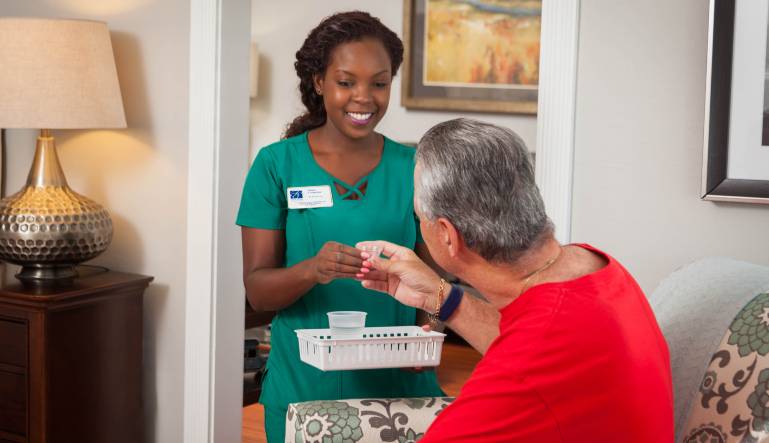Just How Assisted Living Facilities Enhance High Quality of Life for Those With Dementia
Aided living centers play a pivotal role in enhancing the quality of life for people with dementia by applying tailored care approaches that satisfy their distinct requirements. These settings integrate organized activities with psychological support, fostering a sense of community while guaranteeing safety and freedom. The assimilation of appealing programs and family members involvement even more enriches the locals' experience. Yet, the intricacies of dementia treatment continue to advance, triggering a more detailed examination of exactly how these facilities adjust and innovate to satisfy the obstacles dealt with by citizens and their family members. What effects does this have for future care designs?
Personalized Treatment Plans
(Memory Care Facilities Charlotte)In many situations, people with mental deterioration call for tailored assistance that resolves their one-of-a-kind needs and preferences. Personalized treatment strategies are crucial in assisted living setups, as they ensure that each resident receives proper focus and solutions. These strategies are established collaboratively, including healthcare professionals, caregivers, and member of the family to develop a comprehensive introduction of the person's case history, cognitive abilities, and individual rate of interests.
A well-structured tailored care strategy normally consists of specific goals related to health monitoring, day-to-day activities, and social engagement. It makes up the person's cognitive decrease while advertising freedom and self-respect. Routine assessments and updates to the care strategy are vital, as they permit alterations based upon the local's evolving condition and preferences.
Trick elements of these strategies usually involve drug administration, behavioral assistance techniques, and nutritional guidelines customized to the individual's demands (Memory Care). By concentrating on individualized care, aided living facilities can foster a helpful atmosphere that enhances the top quality of life for people with dementia, eventually contributing to their total wellness and happiness. This customized method appreciates the individuality of each citizen, ensuring they get the compassionate care they need

Engaging Tasks and Programs
Involving citizens in meaningful activities and programs is essential for improving the quality of life for individuals with dementia. These tasks not only provide satisfaction yet also boost cognitive feature and promote social interaction, which can minimize sensations of seclusion commonly experienced by locals.

Additionally, tailored programs are vital in ensuring that each local's distinct preferences and capabilities are acknowledged. This tailored approach encourages engagement, enhances self-confidence, and gives a feeling of achievement.
Furthermore, routine analyses of locals' interests can aid staff modify and adjust tasks to far better fit advancing demands. By prioritizing interesting activities and programs, aided living facilities can considerably improve the overall experience and psychological health of individuals dealing with dementia.
Safe and Helpful Environment
Producing a secure and supportive setting is essential for people with mental deterioration, as it directly impacts their well-being and quality of life. Assisted living centers are made with details features that advertise safety and security while promoting a complacency and convenience. These environments focus on access, with designs that lessen complication and motivate freedom, enabling residents to browse their surroundings more conveniently.
Safety procedures, such as protected entries and departures, prevent roaming and unauthorized access, which are critical considerations for individuals with mental deterioration (Assisted Living). Employee are educated to acknowledge the special requirements of homeowners, offering customized support and guidance to guarantee their security. The unification of calming colors and acquainted objects can aid reduce stress and anxiety and disorientation, developing a more reassuring atmosphere.
In enhancement to physical safety and security, emotional support is vital. Facilities often use staff who are not only competent in caregiving yet likewise educated in compassion and communication, promoting depend on and relationship with locals. This all natural approach contributes to a caring setting where people feel valued and recognized, inevitably boosting their total quality of life.
Social Communication and Area
A supportive environment not only prioritizes safety yet also fosters chances for social communication and community interaction, which are important for people with dementia. In nursing home, organized tasks and public rooms motivate citizens to get in touch with each other, lowering sensations of seclusion usually experienced by those with cognitive disabilities.
Social interaction plays a considerable function in boosting psychological wellness and cognitive feature (Memory Care). Involving with peers in group activities such as games, arts and crafts, or exercise not only boosts cognitive capacities however likewise supports a feeling of belonging. Facilities often arrange occasions that advertise socialization, enabling locals to build relationships and share experiences, which can be specifically valuable for those with mental deterioration
In addition, a dynamic area environment can enhance the overall quality of life for residents. Personnel members are trained to assist in interactions and support residents in developing significant connections.
Family Members Involvement and Assistance
Family members participation is important in supporting individuals with mental deterioration in assisted living atmospheres. Proactively engaging household participants not only supplies psychological comfort to residents however additionally fosters a sense of belonging and connection in their lives. When families join treatment planning and everyday tasks, they contribute useful understandings about the individual's choices, background, and requires, which can improve individualized treatment.
Furthermore, regular family gos to can substantially boost the psychological well-being of locals, minimizing feelings of seclusion and stress and anxiety. Household participants can additionally assist in keeping cognitive feature by involving their loved ones in acquainted discussions and tasks. This communication enhances individuality and helps citizens really feel valued and comprehended.

Conclusion
In verdict, helped living facilities considerably improve the high quality of life for people with mental deterioration through individualized care plans, involving activities, and a risk-free environment. Jointly, these factors produce an alternative technique to care that addresses the distinct requirements of individuals with dementia, promoting general well-being and self-respect.